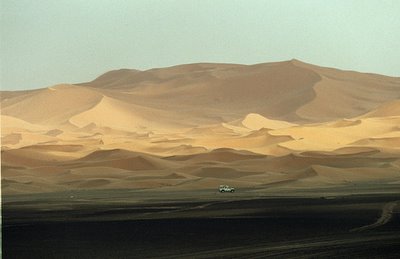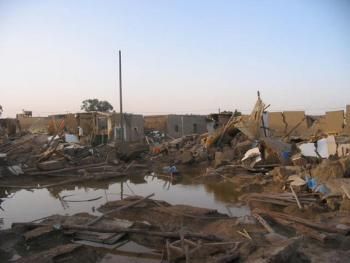On February 14th a group of students from the University of South Westfalia, left their home in Soest, near Dortmund in Germany, to take part in the rally, driving through France, Spain, the heat of the Sahara and the bitter cold of the High Atlas Mountains in winter, to Marrakech, a round trip of seven thousand kilometre. On the way they delivered tons of educational supplies and contributed to building a school. For The View from Fez, Derek Workman reports.

In 1998, six French students from the Ecole Supérieure de Commerce in Rennes, set off in three Renault 4L cars to drive through Morocco and deliver educational materials to impoverished children and schools along their route. This year the rally celebrated their fifteenth trophy, and each of the 1,300 cars, carrying two people aged between twenty and twenty-seven, delivered ten kilos of food and forty kilos of school materials. Over eighty tons of education supplies were handed over to the Association Enfants du Désert, and for the first time in the rally’s history, the participants also donated twenty euros per car, to help build a school. It became known as the student version of the Paris to Dakar Rally.
“It took us a year of very hard work to get the project together,” Tobi Hügemann tells me. “We were split into two groups, one to raise the 36,000 euros we needed to buy the cars and pay all the expenses, and another of mechanics, who are engineering students, who spent three days a week for eight months finding the cars and then almost totally re-building them. But we also had to work on our degrees, so it meant that we had to double up on our study time when we weren’t working on the project.”
With their great adventure ahead of them, they set off on February 14th, pointed in the direction of Poitiers, where the Rally officially began – but didn’t even make it to France. Max Müller was driving one of the cars when the fuel pump failed. Fortunately, it was one of the spares they were carrying, so a change by the side of the road got them going again. At Poitiers, proudly displaying their official plaque with their car number 1443, they began the first stage – only to get as far as one hundred kilometres south of Bordeaux, where this time their problems were more serious.

“One of the wheel bearings went but you need special tools to do the job, which we didn’t have, so we had to call a tow truck to take us to a garage to do the repair.” A long nervous night was ahead; not only because the hotel they stayed in and the cost of the repair was eating into their limited budgets but because they had a deadline of six a.m. two days later to reach Algeciras for the specially reserved ferries to take them over the Straits of Gibraltar into Morocco.
“We barely slept that night, worried that we might not even get to the ferry, but the mechanic at the garage was great. He found some second-hand parts and worked late to get the job done. The drive through Spain was one of the most nerve-wracking I’ve ever experienced, but we got to the assembly point at Algeciras in time.” Which they shared with 2,500 other people – and not a toilet in site!
The adventure really began when they drove off the ferry at Tangiers, (which is probably what the cleaners on the four ferries also thought when they surveyed the results of a night without toilets for their six hundred passengers.)
“It was incredible,” comments Lukas Twittenhoff. “We were in Africa. It was such an amazing culture change, but that had been part of the adventure for us, to go somewhere so different from what we would usually experience.” But they soon discovered that Africa isn’t always hot, and the summer clothing they’d taken didn’t give them a lot of protection from the bitter desert nights or the minus ten degrees they experienced driving over the High Atlas Mountains.
“We were driving over a mountain pass and we could see cars coming toward us covered in ice,” says Max. “A few snowflakes started to fall, and the French drivers in front of us were terrified. They went so slowly that at one point we began to slide backwards. It was the same in the desert; we’d charge through the soft sand to keep moving while they would drive so slowly that they began to sink.” And the stalwart German team laugh at the memory of the French, who seemed to spend more time at the side of the road cooking a meal than actually driving.
Maren Rump is the only girl in the team, but played her part equally and had no problem with being the solitary female. “It was a bit strange the first time we went off-road, and I think we were all a bit nervous, but we soon got used to it, even though at times, when you were driving through a dust storm thrown up by over a thousand cars, you weren’t too sure where anyone else was around you.”
The route sidled south along the coastline from Tangiers, skirting inland above Rabat and passing through Meknes, Midelt, Erfoud, Merzouga, Tighremet and Quarzazate, before arriving at Marrakech. The nights were spent sleeping alongside their increasingly grubby Renaults, the workhorses that carried everything they needed for the eleven day rally; food, drink, sleeping bags, clothes and spare parts – and a camp chair each so as not to totally deprive themselves of a semi-civilised life.
A two-car team from the university completed the Rally in 2011, selling on their cars to this year’s team, who added two more, which will in turn be sold on to another group who will continue the new ‘tradition’ next year.
“It was a wonderful experience,” reminisces Tobi. “We worked so hard for a year, not just on the project, but also to make sure our studies didn’t suffer. But it is such an incredible event, not just for the rally itself, but for all it does to help children with their education.”
I leave them as they get ready for a night on the Valencian town, and pray that the three day drive they have ahead of them to get home will be free from failed petrol pumps and broken wheel bearings – but I can be pretty sure that they won’t be getting bogged down in any sand dunes.
Derek Workman is an English journalist living in Valencia City, Spain – although he admits to a love of Morocco and would love to up sticks and move here. To read more about life in Spain visit Spain Uncovered. Articles and books can also be found at Digital Paparazzi. Derek will be in Morocco to cover the Sufi Festival for The View from Fez.
SHARE THIS!




















